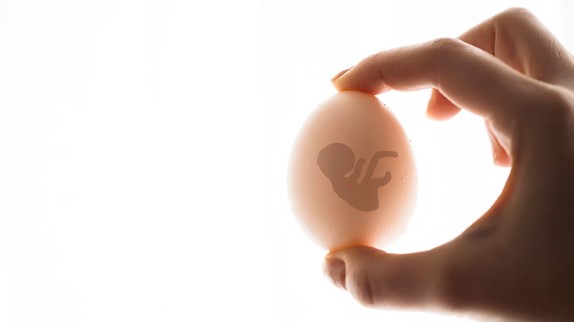Egg & Sperm Donation
When a married couple faces the problem of infertility, they experience a lot of stress and frustration. They have to go through a lot of tests and examinations, which sometimes last for years. Very often, attempts to get pregnant are unsuccessful, the woman wastes years, health, ovarian reserve and, of course, finances. It happens that it is impossible to get a pregnancy with own eggs or husband’s sperm, carry it out and give birth to a healthy child, even with the help of IVF. And the only way out is to use donor eggs and / or donor sperm.
This decision is not easy for a married couple. Patients often need the help of a professional psychologist.

And when this decision is made, patients, in the end, experience incomparable happiness and all the years spent fighting infertility are rewarded with a long-awaited baby, so dear and beloved!
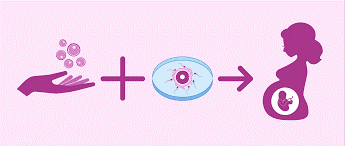
What can be the indications for the use of donor oocytes?
- Age of the woman (43 years and above).
At birth, girls already have a certain number of eggs, programmed by nature; their number does not increase during life,but,on the contrary, decreases. At birth, the number of eggs is 400 thousand-1.5 million, which decrease monthly, die for unknown reasons. By the time of puberty(11-14 years), the ovaries contain about 300-400 thousand eggs.
Every month, several follicles are produced in the ovaries(15-25), but only one egg Matures, which is able to fertilize. The rest, inevitably die. This process can not be stopped, as well as to increase the number of eggs. Thus, the greatest number of oocytes (the scientific name of eggs), as well as their best quality falls on the age of 20-35 years. Then there is a decrease in quality and quantity. After 40 years, these indicators fall sharply. That is, the remaining oocytes are of poor quality and often with genetic abnormalities. This is why it is so difficult to get a pregnancy and a healthy baby after 40 years, even with the help of high technologies like IVF.
- Previously depleted ovaries or premature menopause.
The reason for this phenomenon may be:
– hereditary predisposition (mother and close relatives early menopause).
– surgical interventions on the ovaries(removal of cysts, etc.).
– endometriosis
-cancer and radiation and chimioterapia.
– removal of the ovaries.
-external factors(ecology, stressful situations, medication, radiation, bad habits, etc.).
- Resistant ovaries. That is, the ovaries are not sensitive to stimulation by hormonal drugs, they do not Mature follicles even at high doses of medications
* Congenital abnormalities of ovarian development.
* Genetic diseases of the mother that can be transmitted to the child.
- Repeated unsuccessful IVF with their own eggs(2 or more). In other words, low-quality embryos were obtained, there was no implantation and early miscarriages.
Indications for using donor sperm:
- Absence of a husband / partner.
- Severe disruption of spermatogenesis with a spouse(azoospermia, oligoasthenoteratozoospermia, aspermia).
- Hereditary diseases.
IVF with donor oocytes can be performed using the following options.
- Anonymous donor. When a woman doesn’t know the identity of the donor, but can get acquainted with her profile, physical and medical data. These donors are provided by a clinic or specialized agencies. A woman can choose a donor according to her preferences. most often, they try to choose similar ones based on their physical data-type of appearance, hair color, eye color, face shape, eye section, education, physique, etc. And also by blood type. These donors are professional, most often have already been in the donation program, and the clinic knows all the data about the quality of eggs and whether pregnancies were obtained using their cells. Donors are also tested for viral infections, and often for genetic diseases. Or you can do it on your own.
The donor meets the requirements established by the legislation of the Ministry of Health. These include age requirements (18-33 years), complete physical and mental health, absence of chronic diseases, good looks and lack of excess body weight, absence of genetic and hereditary diseases, the presence of at least 1 own child is welcome and, if available, the child/children do not have developmental disabilities, as well as readiness to undergo medical and psychological types of examination.
- Non-anonymous donor. In this case, the woman or couple is familiar with the future donor. Most often, they themselves find candidates among relatives or acquaintances. In this case, the donor also undergoes a full medical examination.
When using donor sperm, the principle of choice is identical. That is, there can be either an anonymous or non-anonymous donor. Sperm donors also undergo a full medical examination.
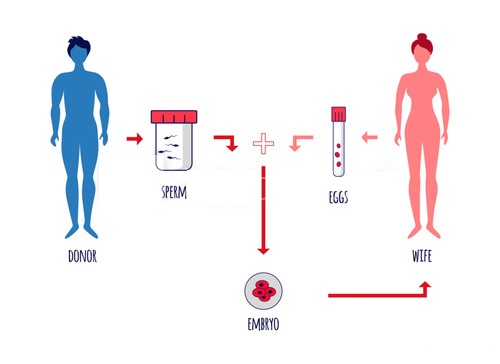
The IVF program with a donor egg can be of two types:
- IVF with a frozen egg, from clinics cryobank.
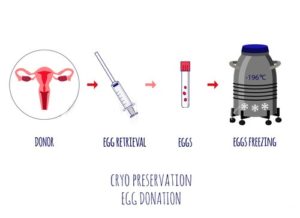
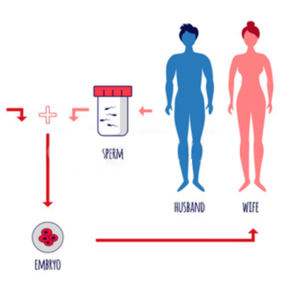
In these cases, IVF is a medical examination of a female recipient, prepare her endometrium, defrost egg donor, insemination with sperm of husband or donor and the embryo transfer into the uterus. Also, if there are embryos of good and excellent quality, they are frozen and stored for the next pregnancy or disposed of at the request of patients.
- IVF with using fresh eggs from a donor.
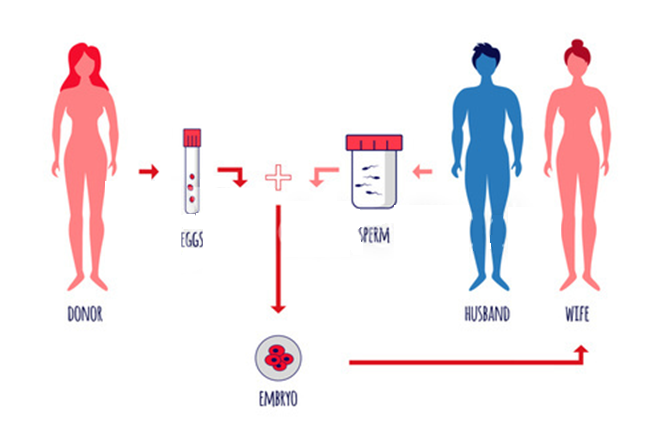
In this type of IVF, patients choose a donor from the donor Bank, and the donor undergoes a full medical examination. The recipient and donor cycles are synchronized. The recipients endometrium is prepared with hormonal preparations for the embryo transfer. The donor, in parallel, is carried out hormonal stimulation of superovulation, which lasts 9-10 days, under anesthesia, oocytes are extracted from the ovaries and fertilized with the sperm of the husband/donor. This is the end of the donor’s function. Then there is the cultivation of embryos, that is, embryologists observe their growth for 3-5 days, and then the best ones are transferred to the uterus of the mother. If there are good and excellent embryos , they are frozen. They are used either for the next pregnancy, or, if the pregnancy did not occur in this cycle, then after 1 cycle, you can again prepare the endometrium, defrost the stored embryos and transfer them to the uterus. At the request and request of the patients, the embryos can be disposed of.
In IVF with donor sperm, a woman goes through all the stages of IVF( preliminary full medical examination, superovulation stimulation, egg aspiration from the ovaries, which is performed under anesthesia, fertilization of the received oocytes with donor sperm and transfer of embryos to the uterine cavity). If the woman is officially registered in marriage, the written consent of the spouse to use the donor sperm is required. This principle is also applicable when using donor oocytes. That is, the written consent of both spouses is required.
Is the use of donor oocytes or sperm 100% guaranteed to get pregnant?
Despite modern and high-tech methods of treatment in the field of ivf, unfortunately, there is no 100% guarantee. But the statistics of good results are steadily growing. To do this, it is important to choose the “right” clinic and experienced doctors.
Failure is influenced by many factors:
– age of women. The highest efficiency and effectiveness is observed at the age of 25-35 years. The older a woman is, and especially over 40 years old, the body’s reserves decrease. Most patients in the older age group have concomitant chronic diseases (obesity, hypertension, varicose veins, etc.) that can negatively affect the ability to carry a child.
– chronic untreated endometritis, endometrial polyps.
– bad habits, wrong lifestyle.
– non-compliance with doctors ‘ recommendations.
But with the right approach to treatment, compliance with all the recommendations of the doctor and the mood-you can definitely achieve the desired.
